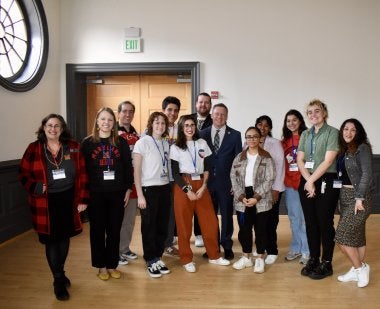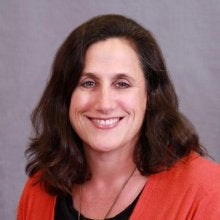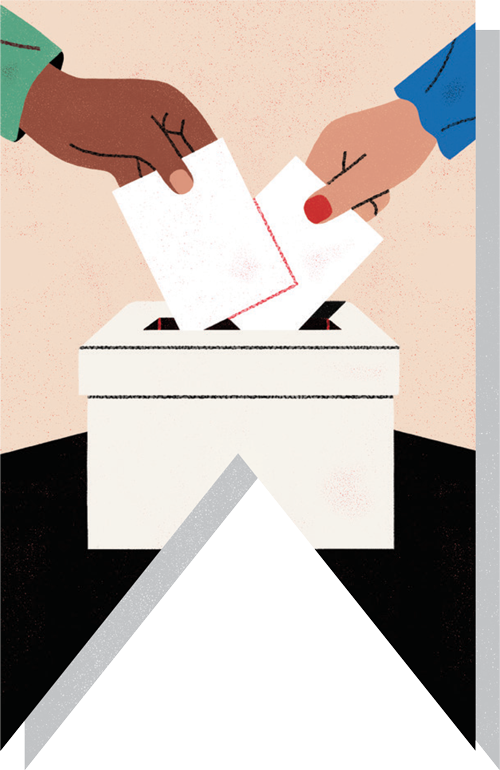
The Maryland Democracy Initiative (MDI), funded by a Grand Challenges Impact Award from the University of Maryland, strives to create a more fair and just society by building the capacity of all people for a lifetime of civic participation. It expands interdisciplinary, community-centered research about democracy and civic engagement; offers innovative teaching and learning opportunities; and hosts civic engagement convenings.
MDI is one of 11 projects involving College of Education faculty that were funded by Grand Challenges Grants earlier this year. In all, the university awarded more than $30 million to 50 projects addressing pressing societal issues, including educational disparities, social injustice, climate change, global health and threats to democracy. The Grand Challenges Grants Program is the largest and most comprehensive program of its type in the university’s history.
Led by Lena Morreale Scott, senior faculty specialist and director of the Civic Education & Engagement Initiative, MDI includes colleagues from the College of Behavioral and Social Sciences, Philip Merrill College of Journalism, School of Public Policy and College of Education.
Scott discusses how the initiative is empowering people to strengthen democracy and make a difference in their communities and society.

What are some of the major threats facing democracy today?
Democracy is under attack. We see it in extreme political polarization, dangerous rhetoric begetting political and social violence, and people’s lack of trust in government institutions, including public schools and higher education. We see it in intentional efforts to undermine fundamental principles of democracy like the rule of law and the peaceful transfer of power. We see it in hyperpartisanism and targeted disinformation designed intentionally to disenfranchise people, to sow seeds of social and racial conflict, and to dupe policymakers and people into denying science. We see it in threats to democracy and free speech in schools, school board meetings and public libraries across blue and red states, and around the world where aspiring despots from the left and right are gaining power and influence.
Why are civic education and civic engagement so important?
When Lincoln was trying to preserve the nation and unify the country, he described democracy as “government of the people, by the people and for the people.” Our government relies on our input and engagement with it. We have the power and the opportunity to choose our elected officials, influence their decisions and hold them accountable. In fact, the first few words of the Constitution are “We the People, in order to form a more perfect union … .” But our democracy doesn’t live up to its ideals because many people’s voices are silent or have been silenced. Many people cannot effectively use their voice to create the change they seek. By preparing and inspiring people to engage in their civic life, we empower them to take on other grand challenges like literacy, climate change and systemic racism. We can’t solve any of these problems if we don’t teach people how to solve problems–using democratic skills like analyzing sources of information, communicating conclusions, advocating for ourselves and others, engaging in dialogue, listening, compromising when appropriate, and building alliances.
There are many elements of civic engagement that can strengthen the fabric that holds us all together. Civic engagement includes voting, but it can also be attending a school board meeting or staying informed about what is happening around you. Civic engagement can be having a meaningful dialogue with people whose political opinions are the same as and/or different from yours and thinking about where there could be common ground. Civic engagement can be volunteering in your neighborhood or joining a community garden.
MDI believes in empowering people with civic knowledge, skills and opportunities for informed, effective and lifelong civic engagement. We want to enable people to use their talent, passion and concern to strengthen democracy. We want to build civic agency: the belief that you can make a difference, that “we the people” can improve our democracy.

How will MDI make a difference?
This initiative has three core areas: research, teaching and learning, and civic engagement opportunities.
MDI’s research includes analyzing the role local news outlets play in strengthening democracy, such as providing voter guides for local elections, including school board races. We also have several research projects related to voting, including research about lowering the voting age to 16, what issues voters care about and the effectiveness of various initiatives to increase voting.
Our College of Education team is researching several elements of effective teaching for civic engagement. I’m working with Ph.D. Candidate Julie Miller to study service learning, a proven practice for effective civic education, and how Maryland’s service learning graduation requirement is implemented across the state. Assistant Professor Sarah McGrew, Professor Doug Lombardi and their graduate assistants, Elizabeth Reynolds and Jenna Alton, are evaluating ways to best prepare social studies and science teachers and their middle and high school students to evaluate online, digital information and to recognize mis- and dis-information and science denial. Associate Professor Lucas Butler is also working with Alton to research the most promising ways to adapt those materials and pedagogy for our very youngest learners.
MDI’s research activities inform our innovative teaching and learning activities. Our faculty and staff have also developed and cotaught courses for journalism professionals. We are working on ways to support instructors across UMD who want to infuse more civic themes and skills into their courses. We’re thinking about lifelong learners and the role of education in all stages of life.
At our civic engagement events, we share research and invite community members to participate in designing solutions to empower democracy. In September, we hosted a Constitution Day Dialogue designed for UMD faculty, students, staff and alumni, affirming our commitment to diversity and democracy. We recently cohosted a National Student Vote Summit with Students Learn Students Vote and TerpsVote, where college students, campus faculty and staff, and leaders from nonpartisan democracy-focused nonprofit organizations from all around the United States came to our campus to share lessons learned and to plan for making a collective impact on voting in the future. We have several more events planned for the winter and spring, as well.
How does having different perspectives from different colleges and community partners enhance this initiative?
To address a complex grand challenge like democracy, you need varied expertise, experiences and perspectives. You need an interdisciplinary approach.
We’re partnering with three other colleges: the College of Behavioral and Social Sciences, College of Journalism and School of Public Policy. We have a fantastic team with amazing scholars. Our four colleges have democracy, social justice and preparing people for civic life as part of our DNA and core mission. Working together allows us to make an exponentially bigger impact than what we can do separately.
We’re also working with the Maryland Civic Education Coalition, a statewide organization that I cochair. The coalition includes students, educators, policymakers, university faculty from across the state and more than 40 community organizations. On campus, we partner with TerpsVote and dozens of other faculty, students and staff in our Cross Campus Civic Engagement Working Group. Nationally, we partner with the ALL IN Campus Democracy Challenge, Students Learn Student Vote Coalition, Vote16 Research Network, Big Ten Collaboration: Democracy in the 21st Century and CivXNow. These partnerships and networks connect us to other scholars, practitioners and advocates that help us learn and that share in our work.
Why does this issue matter to you personally?
My parents taught me justice matters, my voice matters and that I could make a difference in small ways but I could make an even bigger difference when I joined together with other people. I’ve had wonderful teachers, coaches, mentors and colleagues who instilled in me a sense of purpose and belonging and who continue to inspire me to work together. I am blessed to work with a great team with MDI who share a commitment to building a better, more inclusive and more responsive democracy for all.
|
EdTerp Faculty |
|||||||||||||||||||||||||||||||||||||||||||||||||||||||||||||||||||||||||||||||||||||||||||||||||||||||||||||||||||||||||||||||||||||||||||||||||||||||||||||||||||||||||||||||||||||||||||||||||||||||||||||||||||||||||||||||||||||||||||||||||||||||||||||||||||||||||||||||||||||||||||||||||||||||||||||||||||||||||||||||||||||||||||||||||||||||||||||||||||||||||||||||||||||||||||||||||||||||||||||||||||||||||||||||||||||||||||||||||||||||||||||||||||||||||||||||||||||||||||||||||||||||||||||||||||||||||||||||||||||||||||||||||||||||||||||||||||||||||||||||||||||||||||||||||||||||||||||||||||||||||||||||||||||||||||||||||||||||||||||||||||||||||||||||||||||||||||||||||||||||||||||||||||||||||||||||||||||||||||||||||||||||||||||||||||||||||||||||||||||||||||||||||||||||||||||||||||||||||||||||||||||||||||||||||||||||||||||||||||||||||||||||||||||||||||||||||||||||||||||||||||||||||||||||||||||||||||||||||||||||||||||||||||||||||||||||||||||||||||||||||||||||||||||||||||||||||||||||||||||||
Top image: Lena Morreale Scott (left) with colleagues, participants and guests at the National Student Vote Summit.



